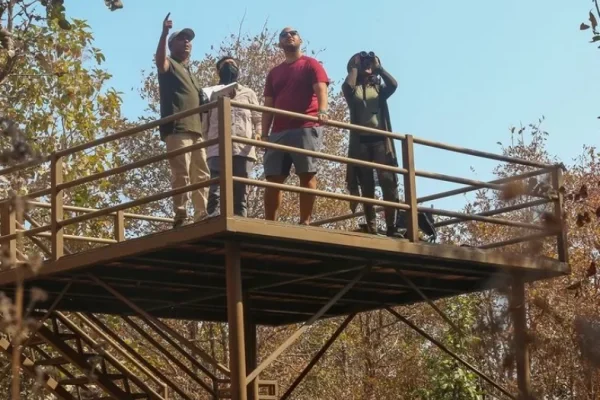In the forests of central India, where tall sal trees cast shifting shadows and the air hums with the calls of unseen birds, lives a predator that rarely makes headlines yet defines the spirit of the wild. These are the Indian wild dogs, or dholes, known for their whistling calls and extraordinary pack behaviour. To see them in action is to be reminded that survival in nature is not always about size or stealth, it can just as powerfully be about unity.
The Discipline of the Pack

Unlike tigers that prowl alone or leopards that melt into thickets, dholes thrive together. A pack is their strength, sometimes small, sometimes as many as twenty strong, each individual tuned into the rhythm of the hunt. They don’t hide in the shadows; instead, they chase openly, fanning out across grasslands to outmanoeuvre their prey.
This is why deer and barasingha(swamp deer) tread warily where dholes roam. A coordinated pursuit by a pack rarely fails. In the landscapes surrounding Tadoba Jungle Camp, naturalists often speak of the sheer electricity of watching a pack at work, each member falling into place as though guided by an unseen conductor.
The Language of Whistles

What sets them apart even further is their voice. Indian wild dogs don’t roar or growl; instead, they whistle. The high-pitched notes carry far, slicing through dense teak forests and echoing across valleys. It’s communication at its most efficient, keeping the pack connected even when the hunt scatters them across terrain.
Those who have spent time near Rukhad Jungle Camp know the eerie thrill of hearing it, a rising whistle, sometimes answered by another, until the forest itself seems to be holding its breath. It’s not just practical; it’s hauntingly beautiful, a reminder of how different these predators are from the giants they share the jungle with.
Equality Over Hierarchy

Predators often live in worlds ruled by dominance, yet dholes defy that rule. Their packs run on cooperation rather than control. Adults raise pups together, food is shared, and even the weakest are cared for. Scientists have recorded adults regurgitating meat for youngsters and injured members, a gesture of survival through empathy, not just instinct.
This behaviour is rarely seen among carnivores, and it underscores just how socially advanced dholes are. Around Pench Jungle Camp, wildlife researchers often recount the rare sight of pups feeding alongside adults without conflict, a scene that reveals the trust and equality woven into their lives.
Courage Beyond Size
Despite their smaller build, dholes carry a fearlessness that surprises even seasoned trackers. They will confront leopards and sometimes even tigers, using sheer numbers and unwavering resolve to hold their ground. For them, the strength of the group outweighs the power of the individual.Moments like this don’t happen often, but when they do, they leave a lasting mark. In the open meadows near Kanha Jungle Camp Resort, stories linger of packs facing down the jungle’s biggest cats. To witness it is to understand the raw courage behind their survival.
Protecting the Whistling Hunters
For all their resilience, dholes face an uncertain future. Habitat is shrinking, prey is declining, and diseases carried by domestic dogs spread silently through forests. Yet their role in the ecosystem is indispensable. They keep herbivore populations balanced, shaping the forest in ways that ripple through every species.
And so, the whistles of the forest grow more precious. To hear them today is to catch a sound that has echoed for centuries but may not always echo tomorrow. The survival of Indian wild dogs rests on our ability to protect the wild spaces that still shelter them, a responsibility that belongs not just to conservationists, but to anyone who dreams of a jungle alive with its full, untamed symphony.



